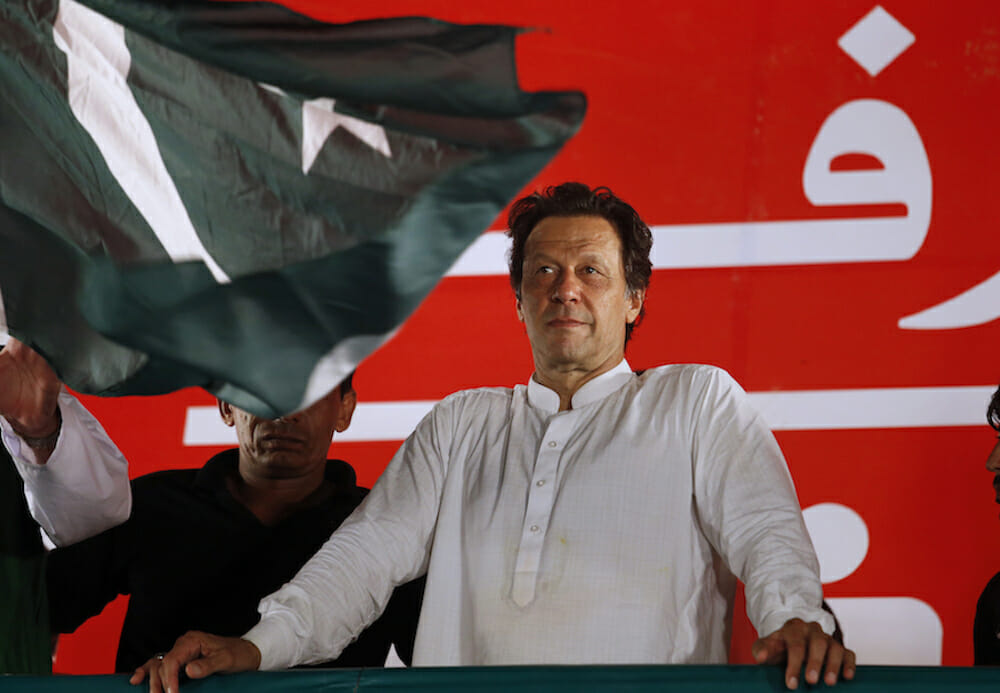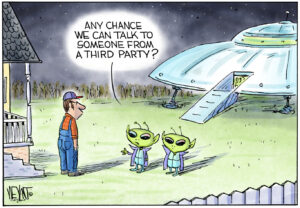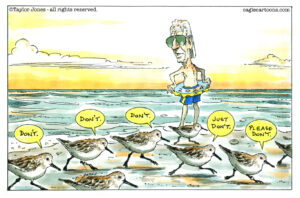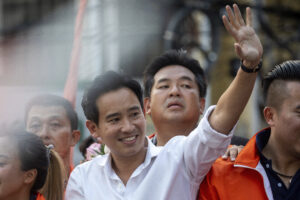Pakistan’s Elections Bring Hope and Uncertainty
Cricket-star-turned-politician Imran Khan, the next prime minister, is talking a good if vague game, but will he follow through on his reform promises? Imran Khan, Pakistan's prime minister-elect. (Anjum Naveed / AP)
Imran Khan, Pakistan's prime minister-elect. (Anjum Naveed / AP)
Truthdig is proud to present this article as part of its Global Voices: Truthdig Women Reporting, a series from a network of female correspondents around the world who are dedicated to pursuing truth within their countries and elsewhere.
KARACHI, PAKISTAN — Last week’s elections in Pakistan yielded predictable outcomes, which could take the country in an unanticipated direction. Preliminary results announced Friday by the Election Commission of Pakistan give the victory to Tehreek-e-Insaf (also known as the PTI, or Justice Party) of the cricket-star-turned-politician Imran Khan. Although his party missed a clear majority in the National Assembly, it should be able to easily woo a few independents to its side to form a stable government.
If there is an unpredictable factor, it is the reaction of the major mainstream parties after their emergence as the losers, especially the Pakistan Muslim League of former Prime Minister Nawaz Sharif. He and his daughter are now in prison after being found guilty of graft in a property case. A multiparty conference of the main losers (in which the Pakistan Peoples Party did not participate) has rejected the results of Wednesday’s voting and demanded new, transparent elections. Will they pay the PTI in its own coin by staging sit-ins to disrupt life in the country, as Imran Khan did in the years following the 2013 elections?
Even prior to last week’s elections, it was widely alleged that the “Miltablishment”—-the country’s military leadership—was creating conditions that improved the prospects of the PTI. Khan is viewed as the darling of the generals. The military establishment’s move to selectively push graft cases against his rivals on the pretext of accountability while turning a blind eye to the wrongdoings of Khan’s cronies was seen as a one-sided attack on the corruption pervasive in Pakistan’s politics.
In the weeks preceding the elections, there were protests from the media as well as from some members of the judiciary against interference from “hidden hands.” What seems to give credence to these charges now is the preliminary statement issued Friday by the EU Election Observation Mission. While praising the Election Commission’s role in the conduct of the polling, the statement categorically said that the “electoral process of 2018 was negatively affected by the political environment.” It spoke of the playing field not being level and of “lack of equality of opportunity” for all contestants.
The U.S. State Department shared the EU observers’ concerns and questioned the fairness of the voting. Pointing out flaws in the elections, the State Department spoke of constraints placed on freedom of expression and on association during the campaign period.
Meanwhile, the PTI’s Khan has promised the people a naya (new) Pakistan. His victory speech, delivered even before the results were officially confirmed, was widely hailed as a statesmanlike and conciliatory piece of oratory.
The 65-year-old prime-minister-to-be said all the right things in a calculatedly correct tone. This was refreshing after the vitriolic outbursts from all sides during the election campaign. Attributing Pakistan’s problems to corruption and the collapse of governance, Khan promised to rebuild all national institutions and root out graft. He assured the nation that he would create a welfare state to lift up the poor and the underprivileged. He promised to try corrupt officials and apply accountability across the board.
This was music to the ears of the people of this country of 208 million, ruled for decades by status-quo forces that have failed to pull most of them out of poverty. But such promises have been made before. The only difference is that the PTI is at the helm for the first time.
What is significant is the refrain one hears from political observers and analysts: We must wait and see whether the promised reform will actually happen. Skeptics are abundant, but the young, savvy and educated who hold privileged positions are euphoric and say the new leadership should be given a chance.
Many people are tired of the turbulence and violence that often occur when political parties stage protests and rallies. Near the end of the campaign for this month’s elections, three suicide bombings killed three candidates and 180 people. Then came another bomb attack on election day, killing 31 people in Quetta, the provincial capital of Balochistan.
What should interest foreign powers is the line the prime minister-elect will take on foreign policy. In his victory speech, Khan spoke about that policy ambiguously. He didn’t mention his views on defense and security, which could have stirred controversy. He was vocal about bringing peace to the region—without saying how he will treat militant elements, some of which he has expressed admiration for in the past.
Khan mentioned his goals regarding six other countries, but he adopted such an unspecific, broad stance that he succeeded in not stepping on any toes, including those of Pakistan’s defense establishment, which is firmly in control of foreign policy. He said he would seek to:
• Strengthen relations with China • Bring peace in Afghanistan (to help bring peace in Pakistan) and have open borders between the two countries • Develop mutually beneficial relations with the United States • Build stronger ties with Iran • Help Saudi Arabia resolve its internal tensions • Improve relations with India, if its leadership agrees; end the blame game between Pakistan and India; stop human rights violations in Kashmir.
The speech was a safe statement of intent; it called for no specific commitments that might be controversial. But a closer look at some of Khan’s previous statements shows him to be anti-U.S., to have reservations about China’s economic practices, to be more pro-Saudi Arabia than many Pakistanis would prefer, to be a hard-liner on India, and to have a soft spot for militants—be they in Pakistan, Afghanistan or Kashmir. Weave into this narrative the military’s own concealed agenda and you will be left guessing as to what the future might hold.
Pakistan, especially its army, has had close ties with China since the 1950s. Islamabad and Beijing have provided each other with unequivocal support—military, diplomatic, economic and political. Sino-Pakistan friendship, said to be as high as the Himalayas and as deep as the Indian Ocean, has benefited both nations in their conflicts with India. Pakistan has used its relationship with China to neutralize the U.S. when the need arose. Today, a time when Pakistan is in deep economic crisis, China’s One Belt and One Road initiative, with its promise of $900 billion infrastructure aid for 65 nations, is a boon for Pakistan, which has yet to become self-reliant.
Pakistan’s relations with the U.S. have seen ups and downs since the war in Afghanistan began, but they have never before reached the current low, demonstrated by President Trump’s 2017 announcement of his “fight to win” policy in Afghanistan, a declaration in which he accused Pakistan of providing havens for terrorists. Then, in his first tweet of 2018, Trump said the U.S. “had given it [Pakistan] more than 33 billion dollars in aid over the last 15 years, and they have given us nothing but lies & deceit.”
Trump also strengthened the hawks in the Pakistan army when he invited Pakistan’s historical enemy India to “help us more with Afghanistan.”
Islamabad’s relations with India have worsened since 2008 when terrorists suspected of coming from Pakistan attacked Mumbai. The previously intermittent dialogue between the two countries remains suspended.
Many believe that in the coming months the new government will make compromises to get everyone on the same page. Khan’s ex-wife, Reham Khan, a television presenter, said in an interview that Khan was known for his “U-turns.” Others—with less of a personal history—agree. Najam Sethi, the editor of The Friday Times, a political weekly published from Lahore, wrote, “Imran Khan … is a different kettle of fish. He may have embraced the Miltablishment as a tactical move but sooner rather than later he will begin to challenge the conventional wisdom of the national security state handed down to him. That’s when all bets will be off.”
The only conclusively reassuring feature of these elections is the failure of the numerous candidates from terrorist groups. Not one of them won. That was the people’s verdict.
Your support matters…Independent journalism is under threat and overshadowed by heavily funded mainstream media.
You can help level the playing field. Become a member.
Your tax-deductible contribution keeps us digging beneath the headlines to give you thought-provoking, investigative reporting and analysis that unearths what's really happening- without compromise.
Give today to support our courageous, independent journalists.









You need to be a supporter to comment.
There are currently no responses to this article.
Be the first to respond.